De Amerikaanse dichteres en schrijfster Sylvia Plath werd geboren op 27 oktober 1932 in Jamaica Plain, een buitenwijk van Boston. Zie ook mijn blog van 27 oktober 2010 en eveneens alle tags voor Sylvia Plath op dit blog.
Ariel
Stasis in darkness.
Then the substanceless blue
Pour of tor and distances.
God’s lioness,
How one we grow,
Pivot of heels and knees!—The furrow
Splits and passes, sister to
The brown arc
Of the neck I cannot catch,
Nigger-eye
Berries cast dark
Hooks—
Black sweet blood mouthfuls,
Shadows.
Something else
Hauls me through air—
Thighs, hair;
Flakes from my heels.
White
Godiva, I unpeel—
Dead hands, dead stringencies.
And now I
Foam to wheat, a glitter of seas.
The child’s cry
Melts in the wall.
And I
Am the arrow,
The dew that flies
Suicidal, at one with the drive
Into the red
Eye, the cauldron of morning.
Edge
The woman is perfected.
Her dead
Body wears the smile of accomplishment,
The illusion of a Greek necessity
Flows in the scrolls of her toga,
Her bare
Feet seem to be saying:
We have come so far, it is over.
Each dead child coiled, a white serpent,
One at each little
Pitcher of milk, now empty.
She has folded
Them back into her body as petals
Of a rose close when the garden
Stiffens and odors bleed
From the sweet, deep throats of the night flower.
The moon has nothing to be sad about,
Staring from her hood of bone.
She is used to this sort of thing.
Her blacks crackle and drag.
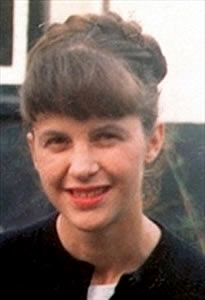
Sylvia Plath (27 oktober 1932 – 11 februari 1963)
De Engelse dichter Dylan Thomas werd geboren op 27 oktober 1914 in Swansea in Wales. Zie ook mijn blog van 27 oktober 2010 en eveneens alle tags voor Dylan Thomas op dit blog.
Verdwijn niet zomaar in de zoete nacht
Verdwijn niet zomaar in de zoete nacht,
Licht op en vlam wanneer je ouder wordt;
Vecht, vecht, omdat het licht niet sterven mag.
De wijze, voor wie straks het duister wacht,
Omdat geen licht meer bliksemt uit zijn woord,
Verdwijnt niet zomaar in de zoete nacht.
De goede man, die aanspoelt en die dacht:
Hier in de baai dansen mijn deugden voort,
Vecht, vecht, omdat het licht niet sterven mag.
De wilde, die met zang de zon aanbad,
En te laat zag, dat dat zijn baan verstoort,
Verdwijnt niet zomaar in de zoete nacht.
De dappere, haast dood, die blind nog zag
Met ogen stralend als een meteoor,
Vecht, vecht, omdat het licht niet sterven mag.
En u, mijn vader, door mij zo geacht,
Vloek, zegen mij met tranen, maar vecht door.
Verdwijn niet zomaar in de zoete nacht.
Vecht, vecht, omdat het licht niet sterven mag.
Vertaald door Arie van der Krogt
Geh nicht gelassen in die gute Nacht
Geh nicht gelassen in die gute Nacht,
Brenn, Alter, rase, wenn die Dämmerung lauert;
Im Sterbelicht sei doppelt zornentfacht.
Weil keinen Funken je ihr Wort erbracht,
Weise – gewiss, dass Dunkel rechtens dauert-,
Geh nicht gelassen in die gute Nacht.
Wer seines schwachen Tuns rühmt künftige Pracht
Im Sinken, hätt nur grünes Blühn gedauert,
Im Sterbelicht bist doppelt zornentfacht.
Wer jagt und preist der fliehenden Sonne Macht
Und lernt zu spät, dass er nur sie betrauert,
Geh nicht gelassen in die gute Nacht.
Wer todesnah erkennt im blinden Schacht,
Das Auge blind noch blitzt und froh erschauert,
Im Sterbelicht ist doppelt zornentfacht.
Und du mein Vater dort auf der Todeswacht,
Fluch segne mich, von Tränenwut vermauert.
Geh nicht gelassen in die gute Nacht.
Im Sterbelicht ist doppelt zornentfacht.
Vertaald door Curt Meyer-Clasons
N’entre pas apaisé dans cette bonne nuit
N’entre pas apaisé dans cette bonne nuit,
Les vieux devraient tonner, gronder quand le jour tombe ;
Rage, mais rage encor lorsque meurt la lumière.
Si le sage à la fin sait que l’ombre est la norme,
Comme aucun de ses mots n’a fourché en foudre il
N’entre pas apaisé dans cette bonne nuit.
Le bon, près de la vague ultime, qui déplore
Que sa vie frêle eût pu danser en verte baie,
Il rage, il rage encor lorsque meurt la lumière.
Le fou qui prit, chanta, le soleil en plein vol,
Et conscient, trop tard, d’avoir bridé sa course,
N’entre pas apaisé dans cette bonne nuit.
Le juste, agonisant, qui voit d’un œil aveugle
Qu’un œil aveugle peut briller, gai, météore,
Il crie, il crie encor lorsque meurt la lumière.
Et toi, mon père, là, sur ces tristes hauteurs,
Maudis-moi, bénis-moi de pleurs durs, je le veux !
N’entre pas apaisé dans cette bonne nuit.
Mais rage, rage encor lorsque meurt la lumière.
Vertaald door Lionel-Édouard Martin
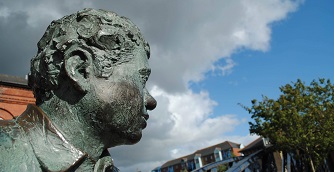
Dylan Thomas (27 oktober 1914 – 9 november 1953)
Standbeeld in Swansea Marine (detail)
De Engelse schrijfster Zadie Smith werd geboren op 27 oktober 1975 in Londen. Zie ook alle tags voor Zadie Smith op dit blog en eveneens mijn blog van 27 oktober 2010
Uit:Swing Time
“If all the Saturdays of 1982 can be thought of as one day, I met Tracey at ten a.m. on that Saturday, walking through the sandy gravel of a churchyard, each holding our mother’s hand. There were many other girls present but for obvious reasons we noticed each other, the similarities and the differences, as girls will. Our shade of brown was exactly the same—as if one piece of tan material had been cut to make us both—and our freckles gathered in the same areas, we were of the same height. But my face was ponderous and melancholy, with a long, serious nose, and my eyes turned down, as did my mouth. Tracey’s face was perky and round, she looked like a darker Shirley Temple, except her nose was as problematic as mine, I could see that much at once, a ridiculous nose—it went straight up in the air like a little piglet. Cute, but also obscene: her nostrils were on permanent display. On noses you could call it a draw. On hair she won comprehensively. She had spiral curls, they reached to her backside and were gathered into two long plaits, glossy with some kind of oil, tied at their ends with satin yellow bows. Satin yellow bows were a phenomenon unknown to my mother. She pulled my great frizz back in a single cloud, tied with a black band. My mother was a feminist. She wore her hair in a half-inch Afro, her skull was perfectly shaped, she never wore make‑up and dressed us both as plainly as possible. Hair is not essential when you look like Nefertiti. She’d no need of make‑up or products or jewelry or expensive clothes, and in this way her financial circumstances, her politics and her aesthetic were all perfectly—conveniently—matched. Accessories only cramped her style, including, or so I felt at the time, the horse-faced seven-year-old by her side. Looking across at Tracey I diagnosed the opposite problem: her mother was white, obese, afflicted with acne. She wore her thin blond hair pulled back very tightly in what I knew my mother would call a “Kilburn facelift.” But Tracey’s personal glamour was the solution: she was her own mother’s most striking accessory. The family look, though not to my mother’s taste, I found captivating: logos, tin bangles and hoops, diamanté everything, expensive trainers of the kind my mother refused to recognize as a reality in the world—“Those aren’t shoes.” Despite appearances, though, there was not much to choose between our two families. We were both from the estates, neither of us received benefits. (A matter of pride for my mother, an outrage to Tracey’s: she had tried many times—and failed—to “get on the disability.”) In my mother’s view it was exactly these superficial similarities that lent so much weight to questions of taste. She dressed for a future not yet with us but which she expected to arrive. »
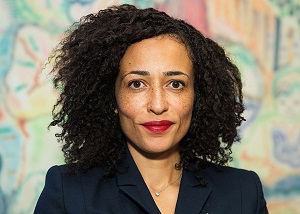
Zadie Smith (Londen, 27 oktober 1975)
De Egyptische schrijfster, gynaecologe, moslimfeministe en politiek activiste Nawal el Saadawi werd geboren in Kafr Tahla op 27 oktober 1931. Zie ook alle tags voor Nawal el Saadawi op dit blog en eveneens mijn blog van 27 oktober 2010.
Uit: Women At Point Zero (Vertaald door Sherif Hetata)
“My father used to occupy the oven room in winter, and leave me the coldest room in the house. My uncle had the bed to himself, while I slept on the wooden couch. Later on, when I married, my husband ate twice as much food as I did, yet his eyes never lifted themselves from my plate.
I stood for a moment near the bed and murmured: ‘But I cannot sleep on the bed.’
I heard him say, ‘I will not let you sleep on the floor.’
My head was still bent to the ground. He kept his hand clasped around my arm. I could see it was a big hand with long fingers like those of my uncle when he touched me, and now they were trembling in exactly the same way.
And so I closed my eyes. I felt the sudden touch of him, like a dream remembered from the distant past, or some memory that began with life. My body pulsed with an obscure pleasure, or with a pain that was not really pain but pleasure, with a pleasure I had never known before, had lived in another life that was not my life, or in another body that was not my body. I ended up by sleeping in his bed throughout the winter and the following summer. He never raised a hand to strike me, and never looked at my plate while I was eating. When I cooked fish I used to give it all to him, and just take the head or the tail for myself. Or if it was rabbit I cooked, I gave him the whole rabbit and nibbled at the head. I always left the table without satisfying my hunger. On my way to market my eyes would follow the schoolgirls as they walked through the streets, and I would remember that at one time I had been one of them, and had obtained a secondary school certificate. And one day I stopped right in front of a group of schoolgirls and stood there facing them. They eyed me up and down with disdain for there was a strong smell of fish arising from my clothes. I explained to them that I had been awarded a secondary school certificate. They started to make fun of me, and I heard one of them whisper into her friend’s ear: `She must be mad. Can’t you see, she’s talking to herself?’ But I was not talking to myself. I was just telling them that I had a secondary school certificate. That night when Bayoumi came home, I said, ‘I have a secondary school certificate, and I want to work.’ `Every day the coffee-house is crowded with youths, who are out of work, and all of them have university degrees,’ he said. `But I must work. I can’t carry on like this.’ Without looking me in the face, he said, ‘What do you mean, you can’t carry on like this?”
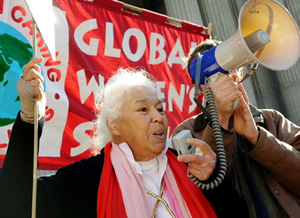
Nawal el Saadawi (Kafr Tahla, 27 oktober 1931)
De Belgische dichter en schrijver Albrecht Rodenbach werd geboren te Roeselare op 27 oktober 1856. Zie ook mijn blog van 27 oktober 2010 en eveneens alle tags voor Albrecht Rodenbach op dit blog.
Morgendeuntje
’t Daget over dorp en land,
heel het oosten laait en brandt,
de bedauwde weiden domen,
wolkskens hangen in de bomen,
wolkskens vlieden langs de vliet,
ieder bladje een dauwdrop giet.
Zingend door de blauwe lucht,
neemt de leeuwerik hoge vlucht,
op de daken dieft de musse,
vogels zingen onder ’t wied:
’t zingt al wat men hoort en ziet.
Over ’t lachend groene veld
’t rinkelend klinkend kloksken schelt,
’t werkvolk met der zonne wakker
spreidt al over hof en akker.
’t Werk begint met bede en lied,
’t wordt al leven dat men ziet.
Trouwlied
op muziek van Peter Benoît
Door woelig jonglingsleven,
door bonte jonglingsdromen,
gelijk ene Elve aan ’t zweven
in lichte morgendomen
ontwaart de Man de Liefde – een toverachtig beeld
dat, troostend en belovend, gedurig rond hem speelt.
Pas eerst in hare bloesem,
het blozen op de wangen,
de Vrouw voelt in de boezem
een vreemd gedurig langen
naar een aanbeden wezen dat, rustig in zijn macht,
haar tederheden lonend, haar steunt en op haar lacht.
Eens daagt voor ’s jonglings ogen
zijn droom – een levend wezen.
Hij spreekt – Zij spreekt bewogen,
en laat hem in haar lezen –
En Hij die schikt en zegent vereent een zalig Paar.
Zij blijve met Hem zalig en zalig Hij met Haar!
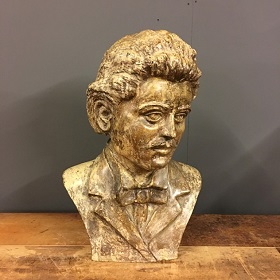
Albrecht Rodenbach (27 oktober 1856 – 23 juni 1880)
Borstbeeld
De Engelse dichter en vertaler Jamie McKendrick werd op 27 oktober 1955 in Liverpool geboren. Zie ook alle tags voor Jamie McKendrick op dit blog.
Salt
We don’t know if tomorrow has green pastures
in mind for us to lie down in beside
the ever-youthful patter of fresh water
or if it means to plant us in some arid
outback ugly valley of the shadow
where dayspring’s lost for good, interred beneath
a lifetime of mistakes. We’ll maybe wake up
in foreign cities where the sun’s a ghost,
a figment of itself and angular
starched consonants braid the tongue at its root
so all sense of who we are is lost to words,
and nothing that we know can be unravelled.
Even then, some vestige of the sea,
its plosive tide, its fretwork crests will surge
inside our syllables, bronze like the chant of bees.
However far we’ve stumbled from the source
a trace of the sea’s voice will lodge in us
as the sunlight somehow still abides in
faded tufts that cling to bricks and kerbstones
on half-cleared slums or bomb-sites left unbuilt.
Then out of nowhere after years of silence
the words we used, our unobstructed accents,
will well up from the dark of childhood,
and once more on our lips we’ll taste Greek salt.
Chrome Yellow
Your three brave sunflowers are ready to drop.
Standing in a jug of stale drink
they’ve all about reached a steepening patch
on the curve of decay. Their dark-eyed
flameheads raddle at the tips and close
then, lax as pulp or crape, they start to droop
on thick eyestalks. That mad Dutchman
who crammed his mouth with the chrome yellow
he used by the tubeful to paint them
made toxic lead his edible gold.
Their gold now lead, the sunflowers turn
towards the black sun of the earth.
Their time has gone. Their big leaves drape
and darken round them like a field of crows.
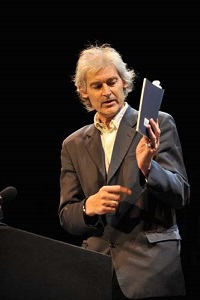
Jamie McKendrick (Liverpool, 27 oktober 1955)
De Amerikaanse schrijfster Frances Ann “Fran” Lebowitz werd geboren op 27 oktober 1950 in Morristown, New Jersey. Zie ook alle tags voor Frans Lebowitz op dit blog en ook mijn blog van 27 oktober 2010.
Uit: Fran Lebowitz On Donald Trump, Protests and Moving to Canada (Interview in Paper Magazine)
“Truthfully, I know this is not the party line — certainly not the line coming from Obama, because it’s his job to act calm — but I’m not a politician, and to me, what this feels like is if the South had won the Civil War. It took them 150 years, but they finally won. That’s what this is. I don’t care what people say. Yes, they lost their jobs and it’s horrible. I wasn’t alone in feeling this, but I would say [on the left] I was unusually sympathetic to these people. I was against NAFTA. They have absolutely legitimate economic grievances, but this does not entitle you to bigotry. There should be no actual connection [between the campaign and bigotry] but the fact that there is — and I don’t know why people are tip-toeing around saying this — they are despicable. I know you’re not supposed to say this, but they are astonishingly ignorant. Who’s not angry? I was born angry. I’d put my rage up against theirs any day of the week. But that doesn’t mean you should get guns or be a bigot.
And guess what, Trump is not re-opening the coal mines or the steel mills. This isn’t Russia where the state controls the mines. It has to be a company and it has to be profitable, and it’s not profitable because it’s much cheaper to make steel in China, as Trump knows because he used their steel to build his buildings.
And as a New Yorker, the ascendance of Rudy Giuliani is equally awful. There’s no doubt in my mind Donald Trump is not going to be president. The only job he’s ever had was working for his father, which is not a real job — it’s a favor. Trump is lazy and has no idea what being president entails. He didn’t even have the grace to look scared when he went to the Oval Office. Obama, who is certainly one of the smarter presidents I’ve had in my lifetime, looked scared [when he first went to the Oval Office] because no one knows what they’re in for until they get there. Every single person on the planet has their life [in the president’s] hands, and it would bother every single person who is intelligent or human. But the president will be Mike Pence, whose policies are despicable, and it’ll be Giuliani and it’ll be Paul Ryan, who is a psychotic nut.”

Fran Lebowitz (Morristown, 27 oktober 1950)
De Tsjechische schrijver, dichter, journalist en vertaler Josef Václav Sládek werd geboren op 27 oktober 1845 in Zbiroh. Zie ook alle tags voor Josef Václav Sládek op dit blog.
Life’s Book
Life is a book we love to read, to own;
this one or that — each volume utmost dear
to its own reader; loth to put it down
of our own free will, in the reading, we’re
so engrossed, that all else around is solely
a hush of noise, struggling our ear to gain,
and ne’er the soul; which is absorbed so wholly
by the ongoing tale — too entertained,
as the days and the hours go slowly by.
Meanwhile, outside, the shadows stretch to fly
and the room fills with twilight, light grows thin,
and the print fades, now scarcely to be seen;
and darkness falls: Evening our way is wending —
and we sigh, put the book down, none too keen.
And not one yet has reached the story’s ending.
Vertaald door Václav Z J Pinkava
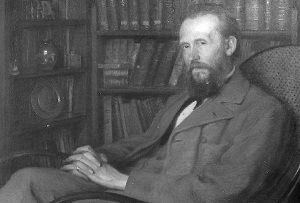
Josef Václav Sládek (27 oktober 1845 – 28 juni 1912)
Portret door Tavík František Šimon, 1899
De Britse schrijfster Enid Algerine Bagnold werd geboren op 27 oktober 1889 in Rochester, Kent. Zie ook alle tags voor Enid Bagnold op dit blog en ook mijn blog van 27 oktober 2010.
Uit: A Diary Without Dates
« The pain of one creature cannot continue to have a meaning for another. It is almost impossible to nurse a man well whose pain you do not imagine. A deadlock!
One has illuminations all the time!
There is an old lady who visits in our ward, at whom, for one or two unimportant reasons, it is the custom to laugh. The men, who fall in with our moods with a docility which I am beginning to suspectis a mask, admit too that she is comic.
This afternoon, when she was sitting by Corrigan’s bed and talkingto him I saw where her treatment of him differed from ours. She treats him as though he were an individual; but there is more in it than that… She treats him as though he had a wife and children, a house and a back garden and responsibilities: in some manner she treats him asthough he had dignity.
I thought of yesterday’s injection. That is the difference: that iswhat the Sisters mean when they say ’the boys.’
********
It was the first time I had a man sing at his dressing. I was standing at the sterilizer when Rees’s song began to mount over the screen thathid him from me. (‘Whatever is that?’ ‘Rees’s tubes going in.’)
It was like this: ‘Ah … ee … oo. Sister!’ and again: ‘Sister … oo … ee… ah!’ Then a little scream and his song again.
I heard her voice: ‘Now then, Rees, I don’t call that much of a song.’ She called me to make his bed, and I saw his left ear was full of tears.
O visitors, who come into the ward in the calm of the long afternoon,when the beds are neat and clean and the flowers out on the tables and the VAD’s sit sewing at splints and sandbags, when the men look like men again and smoke and talk and read … if you could see whatlies beneath the dressings!“
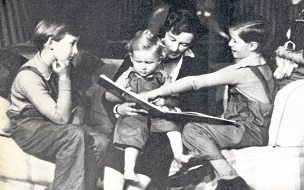
Enid Bagnold ( 27 oktober 1889 – 3 maart 1981)
Hier met drie van haar kinderen
Zie voor onderstaande schrijver ook mijn blog van 27 oktober 2008.
De Iraanse schrijver en filmmaker Reza Allamehzadeh werd geboren op 27 oktober 1943 in Sari, Mazandaran.
Zie voor nog meer schrijvers van de 27 oktober ook mijn blog van 27 oktober 2013 deel 1 en eveneens deel 2.
